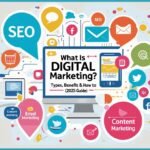Is Traditional SEO Dead in 2025? Here’s What You Need to Know
In 2025, with AI search tools like ChatGPT, Perplexity, and Google’s Search Generative Experience (SGE) gaining ground, many marketers are asking:
Is traditional SEO dead?
The answer isn’t black and white. While old-school SEO tactics like keyword stuffing and link spamming are long gone, the core principles of SEO—value-driven content, user experience, and strategic optimization—are evolving, not dying.
Let’s dive into what’s changed, what still works, and how to future-proof your SEO strategy in 2025.
What is Traditional SEO?
Traditional SEO refers to the foundational practices used to rank websites on search engines like Google. This includes:
- Keyword research & placement
- Backlink building
- On-page optimization (meta tags, headers, etc.)
- Technical SEO (site speed, mobile-friendliness)
While these tactics built the early internet, user behavior and search technology have radically evolved.
What’s Changing in 2025?
Here’s what’s shaking up traditional SEO:
1. AI-Powered Search Engines
Tools like ChatGPT, Perplexity, and Google’s SGE are delivering direct answers, often without sending users to websites. This is known as Zero-Click Search.
AEO (Answer Engine Optimization) is the new frontier.
2. Voice and Visual Search
People now search by asking Siri or uploading images to Google Lens. Traditional keyword-only strategies don’t cut it anymore.
3. User Intent Over Keywords
Google’s algorithms now prioritize search intent and context over exact-match keywords.
4. Content Personalization & First-Party Data
Cookies are phasing out. Brands must now use first-party data and dynamic content for SEO success.
Is SEO Dead? No – It’s Evolving.
Let’s make it clear:
SEO is not dead.
Traditional SEO tactics without context, value, or adaptability? Dead.
How to Win at SEO in 2025
If you want to rank, get traffic, and increase conversions, follow this roadmap:
Focus on E-E-A-T
Experience, Expertise, Authoritativeness, Trustworthiness — Google rewards helpful, human-written content.
Optimize for AEO (Answer Engine Optimization)
- Use schema markup
- Add FAQ sections to answer questions directly
- Incorporate conversational, long-tail keywords
Create Video & Visual Content
Videos, infographics, and carousels improve engagement and rank better on search and social platforms.
Leverage AI & Automation
Use tools like SurferSEO, Jasper, Frase, and ChatGPT to scale quality content faster.
Build Topic Clusters, Not Just Pages
Develop interlinked content hubs around core topics to establish authority and improve search visibility.
Conclusion
So, is traditional SEO dead in 2025?
It’s not dead—but it’s been reborn.
Adaptability is the new ranking factor. To stay ahead, marketers must embrace AI, content experience, user intent, and multi-platform optimization.
If you’re still using a 2010 SEO playbook in 2025, it’s time to upgrade—or be invisible.
FAQ
Q1: Will SEO be relevant in 2030?
Yes, SEO will continue to evolve. It’s moving from keyword tactics to AI-driven strategies based on context and intent.
Q2: What is AEO (Answer Engine Optimization)?
AEO is the practice of optimizing content for AI and voice-based search engines that deliver direct answers, like ChatGPT, Perplexity, and Google’s SGE.
Q3: How can I rank in zero-click search results?
Use schema markup, answer FAQs directly, and focus on concise, informative content that AI can pull answers from.
Q4: Should I still invest in SEO in 2025?
Absolutely. But invest in modern SEO, which includes content design, semantic structure, and AI-readability.





